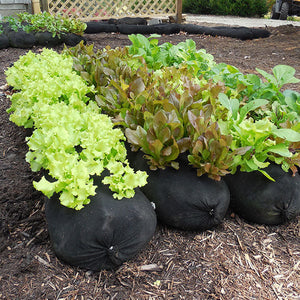Learning how to grow blueberries is highly recommended for anyone looking to boost their health! While they may be tiny in size, the health benefits of organic blueberries make them an excellent source of nutrition for the human diet. In addition to being delicious, the vitamins, minerals and antioxidants contained in blueberries help to fight cancer, support the heart and brain, lower cholesterol, balance blood pressure and more.
When blueberries are in season, they are considered one of the most nutritious foods you can consume, so growing them in your garden and having an abundant supply makes good sense. Eat them fresh off the plant, stir them into cereal or yogurt, or bake them into delicious treats for a nutritious twist on dessert.

Growing blueberries in GardenSoxx® | Plant Family: Ericaceae (Heath)
Different Varieties of Blueberries
While there are a ton of different varieties of blueberry, the ones below are some of the best-tasting blueberries to grow in your home garden:
Northern Highbush Blueberries are the most common variety of cultivated blueberries, native to Canada and the Eastern United States. This variety produces consistently-sized, sweet fruit and stand up well to colder winters.
Lowbush blueberries are most commonly used for canning and freezing. They are smaller than other varieties but have a lovely sweetness that makes them very popular.
Pink Lemonade Blueberries are a truly unique variety that are actually not blue, but indeed pink as their name suggests. With a slight hint of lemon flavor, this distinctive does well in cold climates with mild winters.
The Black Highbush Blueberry is characterized by its glossy finish and darker shade of blue that can appear nearly black when they are ripe. With their uniform size and delicious flavor, this variety is a garden favorite.
Nutritional Information For Blueberries
Nutritional Facts - per 100/g
| Nutrient | Amount | % Daily Value |
|---|---|---|
| Calories | 57 | - |
| Total Fat | 0.3 g | - |
| Sodium | 1 mg | - |
| Potassium | 77 mg | - |
| Dietary Fiber | 2.4 g | - |
| Sugar | 10 g | - |
| Protein | 0.7 g | - |
| Vitamin C | - | 11% |
| Iron | - | 2% |
How to Grow Blueberries in Your GardenSoxx®
As blueberry bushes can take several years to produce a harvest, we recommend purchasing a plant from your local nursery that is well-established. While the plants can grow in partial shade, they do prefer full sun and should be planted in well-draining soil as their shallow roots require oxygen to thrive. They do well in soil that is slightly acidic.
Blueberries Seed to Harvest Time: Blueberries can take up to 3 years to produce a harvest when planted from seed.

How to Harvest Blueberries
Once the berries have turned a deep blue and can be removed from the vine with little resistance, they are ready to harvest. Consume within 2-3 days for optimal flavor and freshness - blueberries can also be frozen for long-term storage or made into delicious jam, jelly, or baked goods.























































